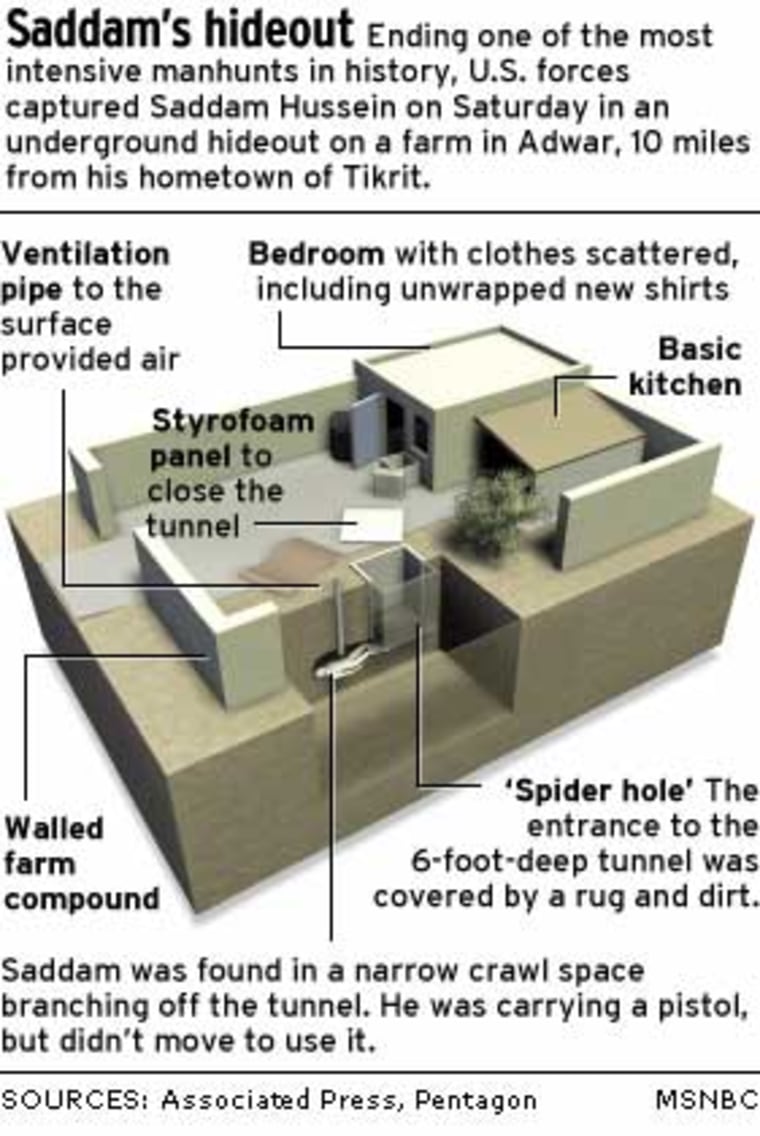The capture of Saddam Hussein means not only the chance to see him brought to justice. It could mean finding out once and for all what kind of a threat he really posed to the world. Namely, whether he possessed weapons of mass destruction. But is a cagey, lying survivor about to open up to U.S. interrogators? And what ways do they have to force the question?
With the search for Saddam Hussein finally ended, the other search that has consumed large numbers of U.S. soldiers and nagged unanswered for years -- the search for weapons of mass destruction -- may finally be answered.
"We still may find weapons and we ought to keep looking," says former CIA director, James Woolsey. "I think there is a chance we still will find weapons of mass destruction. It's possible material was destroyed at last minute in order to keep us from finding it when they found they couldn't use it effectively, possible smuggled to Syria."
The President was so convinced of Saddam's weapons of mass destruction he committed the nation to war over it. But only now, after the fact, will the world have the chance to discover the truth -- that's if the captured dictator will finally answer the question that has eluded so many for so long: Does he or doesn't have have stockpiles of biological, chemical, or nuclear weapons, and if so, where are they?
There was no doubt that before the first Gulf War in 1991 Saddam's government had pursued nuclear, biological and chemical weapons with frightening success, even using chemical weapons on his own people.

United Nation's inspectors examining Iraq's weapons programs during the 1990s found thousands of rockets and artillery shells outfitted for nerve gas, anthrax and other toxins. And according to one estimate during that time, Iraq was only months away from creating a nuclear weapon when inspectors dismantled the program. Then last year, shortly before President Bush invaded Iraq, U.N. inspectors there found a few empty rockets that could carry chemical weapons. But whether those warheads were part of an active weapons program was never resolved. Then, months later, during the war, Pentagon officials said they thought they had uncovered more evidence of Saddam's ongoing chemical weapons program.
But once again, there was nothing approaching a smoking gun, promising leads were evaporating. And even though U.S. troops fought for weeks in their chemical protection suits, the feared gas attacks never materialized. So was the Bush administration wrong about Iraq having weapons of mass destruction?
"He almost certainly had chemical and biological weapons," says Michael O'Hanlon, a senior fellow at the Brookings Institution, a Washington think tank. He was a defense policy analyst for Congress in the 1990s. "You have to conclude he really had them and he really wanted them. And he really thought he could hide them from us. That's the most logical explanation and virtually everyone came to that same conclusion."
That theory gained credence just last week, when a top Iraqi air commander told NBC News key units of Saddam's army were equipped with biological or chemical weapons, powered by short range grenade launchers, and the man himself had given orders to use them. But his own soldiers simply disobeyed.
"The orders were clear -- use the secret weapons when the situation gets critical. But the army turned and went home," according to one commander, who spoke anonymously, and also said these weapons were hidden in the desert. But if there are stockpiles anywhere, NBC News learned today the administration has apparently found the search for them so fruitless, it has begun diverting resources from the hunt for WMD To the more pressing problem of putting down the insurgents who've been killing American soldiers almost daily. But without proof positive, the administration for months since the war has been on the defensive.
Now that he's in custody, will Saddam himself give up the goods to try to save his skin?
"My hunch is that he will do his best to not give anything away and lie, but even liars are sometimes useful to talk to," says Woolsey.
Perhaps -- but U.S. interrogators reportedly haven't found it useful -- yet. Saddam's still insisting the U.S. "dreamed" up his WMD as a pretext for war. But some doubt he may even know the specifics of where those weapons would be.
"That's not likely the detail he will be on top of," says Woolsey. "More likely, one his subordinates would be. But as they say in the Old West, they should give him a fair trial, and then hang 'em."